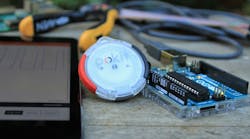The World's Smallest Oscilloscope, Multimeter and Logger?
The following article was originally published in eeNews Europe. It is reprinted here with permission.
Created by Sydney-based Australian company Ingenuity Electronics Design, the Pokit Meter has many attractive features for the maker community. Small-enough to fit on a key chain, the tiny Bluetooth-connected instrument leverages a smartphone or tablet's screen and processor to display a wide range of measurement parameters.
The device is intended for low voltage work up to audio frequencies. A full-featured multimeter, it accurately measures AC/DC voltage, AC/DC current (10mV to 60V DC, 42V AC RMS, +-0.5%), resistance from 1 to 10M Ohm (+-5%) and ambient temperature from 1 to 60°C. It also includes a continuity and diode checker.
The rounded instrument can also operate as a single-channel Digital Storage Oscilloscope that captures 14-bit voltage and current waveforms at 200kSamples/s for display on a smartphone or tablet, with pinch and drag gestures setting the acquisition voltage scale and time base, and touch for trigger mode selection. In this mode, it is specified for currents from 1mA to 2A, and acquisition times can be set from 10ms to 10 seconds.
The unit also functions as a stand-alone data logger for temperature, voltage or current waveforms for periods up to 6 months without connection to a phone. For all these features, it comes incredibly cheap at 90 AU$ (approximately 58€) in theKickstarter edition .
Designed with spring-loaded retractable leads with a retract button, the Pokit Meter comes in a zip lock pouch with two attachable probe clips, one fuse and a replaceable Lithium coin battery. The tiny instrument has gathered so much backing on its Kickstarter campaign that it already broke through a number of stretch goals, including an app upgrade and the battery analyzer module.
It is not far off unlocking an in-app Fast Fourier Transform (FFT) capability and the team at Pokit could also boost the module's acquisition speeds up to 1M sample per second if reaching the USD 150,000 stretch goal.
